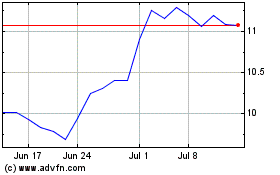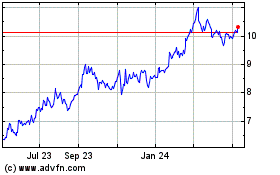Morgan Stanley's Gamble Pays Off -- WSJ
January 05 2019 - 3:02AM
Dow Jones News
Value of MUFG's alliance with the U.S. firm on full display in
Bristol-Myers deal
By Liz Hoffman
This article is being republished as part of our daily
reproduction of WSJ.com articles that also appeared in the U.S.
print edition of The Wall Street Journal (January 5, 2019).
When Morgan Stanley sold one-fifth of itself to Mitsubishi UFJ
Financial Group Inc. in 2008, naysayers said it had sold out too
cheaply in the panic and shackled itself to a sleepy Japanese
bank.
"People thought we'd made a mistake," Colm Kelleher, Morgan
Stanley's No. 2 executive, said recently.
Today, the alliance between Morgan Stanley and MUFG, as it is
known, has done for both banks what neither could have accomplished
alone. It has created a leading investment bank in Japan and given
Morgan Stanley the added muscle of a $2.8 trillion balance sheet to
compete with larger rivals at home, as lending takes on bigger
import on Wall Street.
The partnership's value was on clear display Thursday when
pharmaceutical giants Bristol-Myers Squibb Co. and Celgene Corp.
announced their merger. Morgan Stanley and MUFG will together lend
$33.5 billion to back the deal, one of the biggest bridge loans on
record.
Morgan Stanley couldn't write a check that size by itself. Even
behemoths like JPMorgan Chase & Co. tend to max out around $25
billion to a single borrower. Goldman Sachs Group Inc. and Barclays
PLC raised eyebrows in 2017 by each lending $20 billion to finance
CVS Health Corp.'s takeover of Aetna Inc.
By bringing in MUFG, Morgan Stanley keeps the loan's fees -- and
bragging rights -- away from U.S. rivals. Freeman Consulting
Services estimates the two firms could split up to $170 million, on
top of millions more Morgan Stanley will earn as an adviser to
Bristol-Myers.
The partnership traces to September 2008, when MUFG bought a 21%
stake in Morgan Stanley after skittish investors dumped the bank's
stock. The $9 billion investment was a badly needed lifeline and
helped calm investors who had worried Morgan Stanley would follow
Lehman Brothers into bankruptcy. Morgan Stanley shares rose after
the deal was announced.
The pair later set up two joint ventures to combine their
strengths: Morgan Stanley's in international deal-making and stock
underwriting, MUFG's in Japanese corporate and retail banking.
With an $865 billion balance sheet -- one-third the size of
JPMorgan or Bank of America Corp. -- Morgan Stanley struggles to
compete in situations where clients want money, not just advice.
MUFG's Yen306 trillion ($2.8 trillion) balance sheet has
helped.
Last year, the two firms teamed up to provide a $27 billion loan
for Cigna Corp.'s takeover of Express Scripts Holding Co., which
was Morgan Stanley's largest lending commitment until this week.
"That is not something typically you would expect from Morgan
Stanley," Mr. Kelleher said at the time. "You'd expect that from
one of the big lending banks."
In MUFG's 24% stake, Morgan Stanley Chief Executive James Gorman
also gets a steadying presence in turbulent moments -- for example,
when an activist investor took a stake in the bank in 2016.
MUFG, meanwhile, has gained a foothold on Wall Street, avoiding
the pitfalls of other Japanese banks that have struggled to crack
the U.S. market, or done so in fits and starts. "Building from
scratch takes too long," MUFG CEO Nobuyuki Hirano said in a recent
interview.
MUFG also gets to record a chunk of Morgan Stanley's profits --
up 40% since 2014 -- as its own. Mr. Hirano, who worked as a young
investment banker at Morgan Stanley covering big paper companies,
sits on Morgan Stanley's board and meets twice a year with top
executives including Messrs. Gorman and Kelleher.
The partnership has succeeded in Japan, too, where Morgan
Stanley underwrites securities and distributes to MUFG's millions
of retail clients. The firm, which ranked 10th in Japanese M&A
in 2009, has been No. 1 four of the past six years, and won roles
on high-profile initial public offerings of Japan Airlines and
Japan Post.
Mr. Gorman said in 2017 that his firm and MUFG had teamed up for
about 500 transactions globally to date since starting their
partnership. "Being partnered with...the monster in the marketplace
has been tremendously advantageous," Mr. Gorman said.
The two banks have discussed ways to broaden their partnership,
including by selling Morgan Stanley's retail brokerage services to
MUFG's customers in Japan. Morgan Stanley largely got out of
overseas wealth management in 2014 after retreating from
Europe.
Write to Liz Hoffman at liz.hoffman@wsj.com
(END) Dow Jones Newswires
January 05, 2019 02:47 ET (07:47 GMT)
Copyright (c) 2019 Dow Jones & Company, Inc.
Mitsubishi UFJ Financial (NYSE:MUFG)
Historical Stock Chart
From Jun 2024 to Jul 2024

Mitsubishi UFJ Financial (NYSE:MUFG)
Historical Stock Chart
From Jul 2023 to Jul 2024
